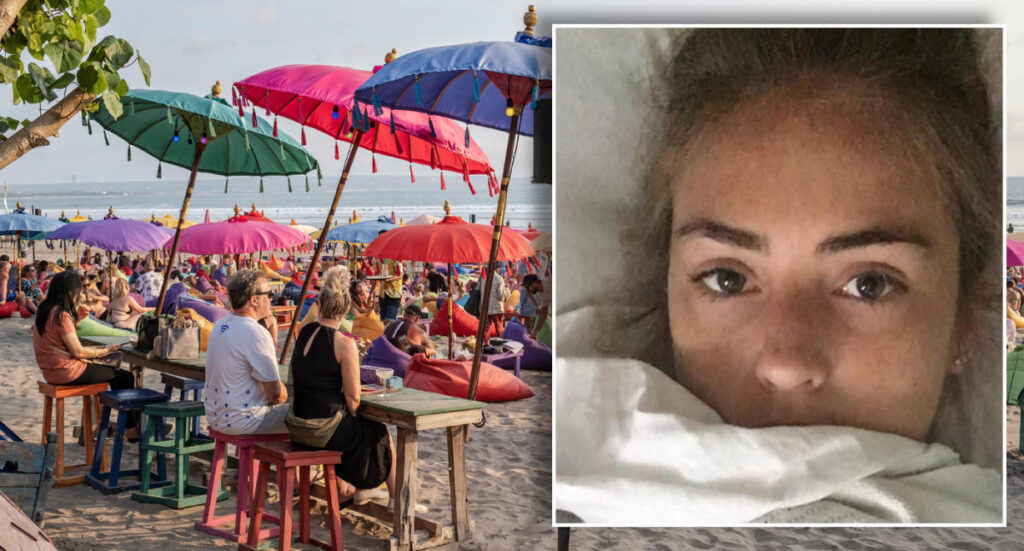Australians are on heightened alert as dengue fever outbreaks continue to surge in several holiday destinations, including Bali and Thailand, with one insurer claiming claims have “at least doubled” this year.
A month after authorities urged travelers to “cover up” to avoid mosquito bites, 1Cover Travel Insurance revealed on Tuesday that there was a “surge” in travelers contracting the disease abroad. . The virus not only makes people seriously ill, but in some cases, insurance costs can run into the tens of thousands of dollars.
“Acquiring dengue fever abroad can have serious health and economic consequences,” spokesperson Natalie Smith said. “Even in cases of mild illness, the average cost of treatment and care for a traveller with dengue fever is approximately $7,000.”
Model infected with dengue fever returned to Australia
Natalie said the company recently helped a couple in their 20s with $20,000 in bills after coming down with dengue fever.
“There was also a $52,000 claim related to model Emily Garr, who contracted severe symptoms of dengue fever while traveling in Asia,” she added. “Emily was hospitalized for 10 days and she had to be airlifted to Australia for further treatment.”
Emily told 1Cover she felt like she’d been “hit by a bus” after waking up in Bali after a night out with friends, but initially thought she had a hangover.
“I didn’t know what it was, but by the night it became unbearable. I couldn’t move and I thought I was going to die,” she said. “My memory is hazy because it was so painful.” She is believed to have contracted dengue fever from a mosquito bite in Vietnam a week ago.
Marley, a Sydney woman, contracted dengue fever late last month and spent eight days in a hospital in Bali. Source: Provided
Earlier this month, Yahoo News spoke to Marley, from Sydney, who contracted the virus while traveling alone and spent eight days in hospital in Bali. “It was very scary. She had never been in an ambulance and had never had any health problems when she was overseas,” she said.
Preventive measures against dengue fever
The most effective prevention method is to protect yourself from mosquito bites. According to 1Cover Travel Insurance, the following measures are recommended:
Insect repellents: Insect repellents that contain DEET tend to be more effective than herbal remedies. The use of aerosols is prohibited on airplanes, so pack your roll-on in your suitcase for convenient use.
Cover your skin: Wear light-colored, loose-fitting long pants and long-sleeved shirts to minimize skin exposure. Please use a mosquito net when sleeping.
Avoid peak mosquito season. Dengue-carrying mosquitoes are usually most active after sunrise and before sunset, so be especially careful during these times.
Remove stagnant water sources: Mosquitoes breed in stagnant water sources. If possible, remove vases and plants with water pans.
Australian tourists visiting dengue hotspots during the rainy season are being urged to cover their skin and use insect repellent. Source: EPA/AAP
Having dengue twice increases risk of bleeding
More than 62,000 dengue cases have been reported in Indonesia so far in 2024. The Washington State Department of Health issued a warning to international travelers after 138 of the state’s cases recorded this year were acquired domestically.
Most people have mild or no symptoms, but 1 in 20 people will develop severe dengue fever, which can lead to shock, internal bleeding and even death, according to the Centers for Disease Control and Prevention.
“If you are infected twice with dengue fever, you run the risk of developing a bleeding syndrome that requires hospital treatment and can be fatal in a small number of cases,” Professor of Infectious Diseases Jill Kerr said on Tuesday. told.
More than 62,000 cases of dengue fever have been reported in Indonesia so far in 2024. Source: EPA, via AAP
“There is no antiviral treatment for the disease, but there is a vaccine. The vaccine is not available to everyone – only adults and those who have had dengue fever, and vaccination comes at a personal cost.”
“Over the years, we have seen an increase in the number and occurrence of dengue cases and Australian travellers should protect themselves from dengue by using clothing that covers their arms and legs and mosquito repellent to protect against mosquito bites.”
Consult your doctor if your fever persists within 7 days of returning from a dengue-endemic area.
Have a story tip? Email: newsroomau@yahoonews.com.
You can also follow us on Facebook, Instagram and TikTok. twitter And YouTube.


